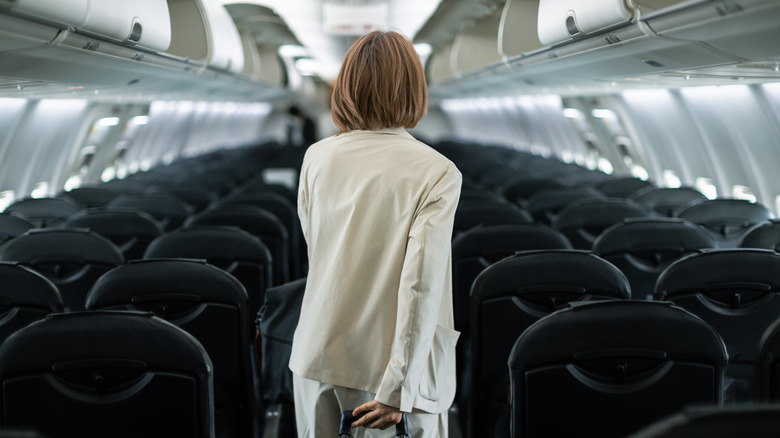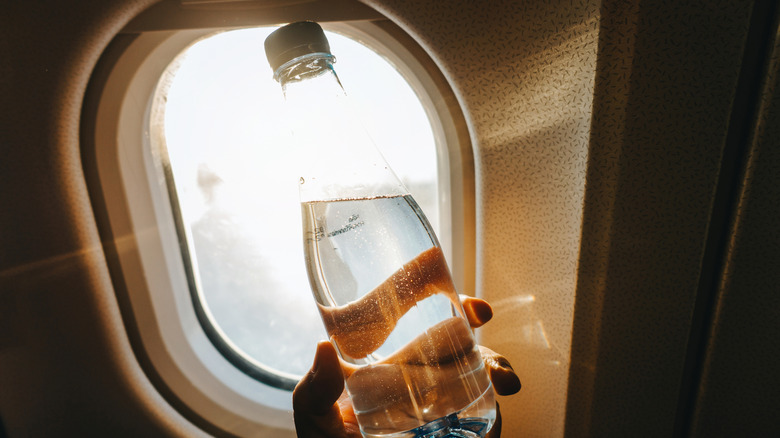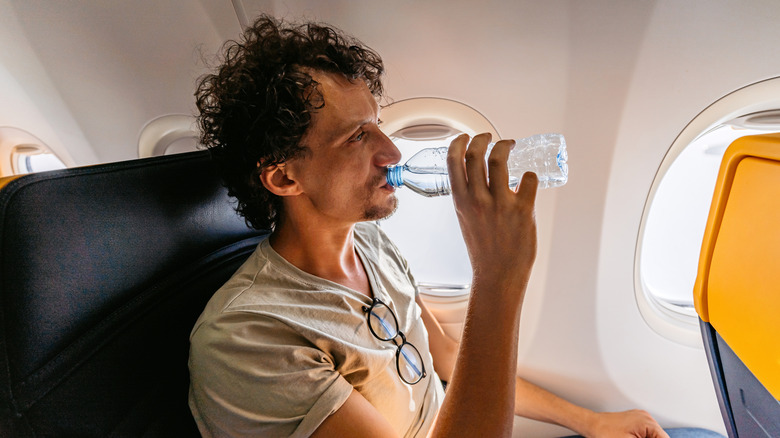The Unexpected Science Behind Why You Pass More Gas On A Plane (And Why You Can't Stop It)
Traveling by plane can be a stressful experience full of long lines, possible delays, and other complications. Even the perk of earning air miles probably isn't worth the hassle, but if you need to traverse a long distance quickly, air travel is usually unavoidable. What you may not realize is that there is a common but unfortunate side effect of flying that also happens to be unavoidable, and it's probably not what you think. Science says you're going to fart more in the air than you do on the ground, and while there are a few ways to set yourself up for a little less flatulence during your travels, the unfortunate truth is there's not much you can do to stop it.
It's perfectly normal for you to feel pressure in your body once the plane takes off. In fact, it's not just happening to you — it's happening to everyone, and there's a scientific reason for why you feel the urge to let one loose despite being unable to distance yourself from dozens of strangers.
"The short and simple explanation about flatulence on planes has to do with the laws of physics and the Ideal Gas Law," says Joseph Weiss, a gastroenterologist and professor of medicine at the University of California (via Well+Good). "The law basically states that gasses expand in volume as temperature rises, or pressure decreases. As you go higher up in altitude, the atmospheric pressure decreases and, as the law dictates, intestinal gas increases in volume. More gas in the digestive tract equals more gas to expel."
Read on for ways you can see this law at play with your own two eyes, and for a few tips and tricks to lessen its affect on your system the next time you board a flight.
You can actually see the 'Ideal Gas Law' in action while flying
Having a hard time believing that the Ideal Gas Law would make such a difference in your body? Well, seeing is believing, and there are a few visual representations of this rule that occur on airplanes every day. If you're a frequent flyer, we're betting you've already seen some of them yourself.
For example, you may want to exercise caution in bringing any reusable cups with straws on your next flight, as one TikTok user shared with her followers back in December of 2023. Kat Darby of Portland, Oregon, found out about the Ideal Gas Law the hard way, and she described the incident in a video, claiming her 30 ounce water bottle doused no less than 15 people when she released the built in straw. This unfortunate accident occurred due to the pressure that built in Darby's water bottle after the plane took off.
Flight attendants also experience something similar in their snack carts — 20 bags of chips will fit nicely in a drawer while the plane is on the ground, and then all of a sudden it's a fight to open that same drawer when it comes time for snack service in the air. This is because the bags will expand as the volume of gas increases, sometimes even popping open.
The law also operates in reverse, when the plane lands. A water bottle with a sealed cap may look very different when you pull it out of your seatback pocket after the wheels touch down. If it shrank in size, that's because the volume of gas in the bottle once the plane is on the ground will be less than the volume of gas in the bottle while the plane is in the air.
What can you do about having to fart on a plane?
Once you've finally reached your seat on the plane there's not much you can do to save yourself from the embarrassment of passing gas publicly, and not only that, you definitely shouldn't try to hold it in. According to a 2013 study entitled, "Flatulence on airplanes: just let it go," published by the New Zealand Medical Journal, it can be detrimental to your health to attempt to do so. The study cautions against "holding back," explaining: "This option is obviously alluring, however it holds significant drawbacks for the individual such as discomfort and even pain, bloating, dyspepsia and pyrosis just to name but a few resulting abdominal symptoms."
While most rookie mistakes people make as a first time flier have nothing to do with farting, there are a few things you can do on the ground to lessen the probability of a smelly incident. One of the most important in-flight hygiene tricks frequent fliers swear by is staying hydrated, but what you hydrate with is also important. To lessen the gas in your system it would be wise to avoid soda, seltzer, and other carbonated drinks the day before a trip. Remember, the more gas you already have in your body, the more will need to come out.
Try avoiding foods that typically trigger flatulence for you, and consider eliminating any gum chewing, which can cause you to swallow air. Chewing your food slowly and intentionally will also help with introducing less gas to your system. You could also try popping a probiotic or an over-the-counter medication designed to help your body process food that is higher in gas production to set yourself up for success, but if all else fails, remember it's better to just let it rip.


